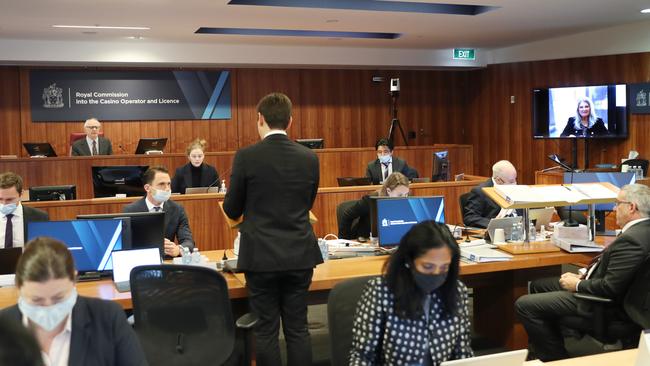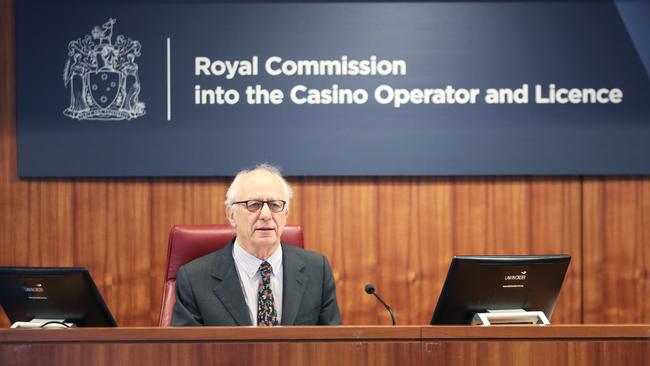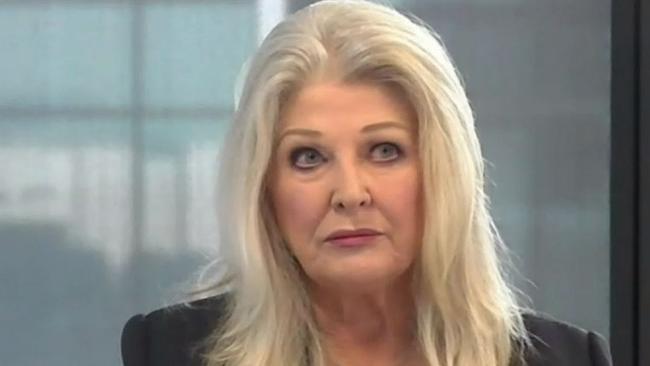Commission hears of potential lifeline for Crown Resorts and its Melbourne casino
Lawyers for the Victorian royal commission into Crown Resorts have outlined ways the James Packer-backed group could hold on to its prized asset.

Crown Resorts could be given two years to show it has truly reformed itself and has become a suitable operator of its flagship Melbourne casino, under a plan proposed by counsel assisting the Victorian royal commission into the James Packer-backed group.
But the lifeline would be highly conditional, subject to checks by a state-appointed external monitor, necessitating the further exodus of long-term senior Crown employees and additional investments in reform efforts, with no guarantee that the company would emerge with its casino licence intact.
It would be a costly exercise for Crown, which has already heavily invested in a reform agenda in a bid to regain suitability for its NSW casino licence after the Bergin Inquiry temporarily revoked it earlier this year.
The proposal was contained in counsel assisting’s written submissions to the commission that were released on Sunday, less than a week after the team of lawyers formally recommended that commissioner Raymond Finkelstein make a finding of unsuitability when he hands down his final report in October.
It also comes a day before a separate WA royal commission into the company begins hearings relating to activities at Crown’s Perth casino.
Although the written submissions state Mr Finkelstein would be justified in recommending the Victorian government cancel Crown’s casino licence outright or revoke it on public interest grounds, he could also recommend Crown be regulated to reform.
“While the evidence suggests the reform of Crown may be possible, it will be complicated and nothing short of complete, holistic, bottom up and down reform is required,” counsel assisting wrote.
“The only way in which Crown Melbourne can return to a position of suitability is if those regulating its affairs (the Victorian Commission for Gambling and Liquor Regulation and government) are prepared to give Crown Melbourne the time that it needs to implement the necessary reforms and are prepared to trust that Crown Melbourne will diligently pursue those reforms.

“Having regard to the nature and extent of Crown’s failings, the task of reform is enormous, the path is uncertain, and the outcomes are speculative.”
Counsel assisting added that this scenario would likely involve Crown continuing to operate the Southbank casino while it is technically unsuitable to hold the licence, it would need to be strictly monitored by an independent expert with “extensive” powers.
“Leaving Crown in effective control of the casino, a licensee found to be unsuitable, cannot occur unless that control were subject to supervision of some kind – whether a manager under s 22 (of the Casino Control Act), or a monitor, which would need to be implemented by legislative amendment to create the office of a supervisor,” they wrote.
“Given the size of the task, the cost of supervision will be considerable. The cost of supervision should, in all the circumstances, be borne by the licensee.”
This interregnum period could last until 2023, counsel assisting suggested, which is when the VCGLR is due to conduct its regular review into Crown Resorts.
“It would be for the regulator then to decide whether Crown Melbourne has reformed, and is, at that point in time, suitable,” they wrote, also noting that another yardstick may be preferable as there is “legitimate concern” about the adequateness of the VCGLR’s review process, having failed to pick up on issues with the company in the past.
If the licence is cancelled outright, counsel assisting suggested the impact on the Victorian economy and the more than 11,000 Crown Melbourne employees could be reduced by deferring the date of cancellation by “a year to 18 months” in order to arrange for a smooth transition to a new operator.
“Some level of disruption will be inevitable, but if the end result is the grant of a new licence to a person who is suitable, then that disruption may itself be in the public interest in the long run,” counsel assisting wrote.
However, they also noted that legally nothing prevented Crown Resorts from reapplying for the licence – a situation that could act as a motivator for genuine reform.
“Cancellation of the casino licence in the manner described above, with the opportunity to reapply, would provide real incentive to implement its reform program.”
Although in the written submissions counsel assisting said it could not describe the specific steps Crown needed to take to become suitable, they said it would involve a further overhaul of the board and senior employees.
It will be a blow for Crown, which recently purged staff indicted by the Bergin inquiry or strongly linked to Mr Packer, leaving it light on talent.
It was made clear that “it was not desirable” for executive chair Helen Coonan and Crown Melbourne CEO Xavier Walsh – who were also subject to recommendations of unsuitability last week – to be considered candidates for reform.

Ms Coonan has previously stated her intention to retire when a new chair has been recruited.
And although the pages of the submissions detailing other Crown managers were mostly redacted, counsel assisting singled out responsible gaming boss Sonja Bauer for her “defensive” nature towards Crown’s failure to meet its responsible gaming obligations at her appearances before the commission.
They also slammed regulatory and compliance manager Michelle Fielding for not picking up on an illegal gaming chip payment method favoured by VIP high rollers.
“As a result, there is doubt whether Crown can achieve the required reform while Ms Bauer and Ms Fielding occupy senior positions in RSG and Compliance,” they wrote.
Counsel assisting also said many of the Crown executives and managers that knew the company was incorrectly deducting loyalty expenses from pokie revenue – resulting in a potential tax underpayment that could amount to more than $400m – should be moved on.
“Crown should also review the role that other executives and senior officers played in the underpayment of tax issue.”
Finally, the commission’s lawyers recommended that Victoria’s regulatory approach to casinos be modified, reaching the conclusion that a “risk-based approach” that favours self regulation is ineffective.
“In the circumstances, where Crown has been combative, and has legalistically pursued ways around the regulatory environment in the pursuit of profit, and where the VCGLR has not demonstrated a willingness to take meaningful enforcement action, there are grounds to conclude that the risk-based approach has failed,” they wrote.







To join the conversation, please log in. Don't have an account? Register
Join the conversation, you are commenting as Logout